Hey guys, welcome back to the Dr. Cliff AuD vlog. This is vlog number 153, and today I'm going to be answering more of your questions, but before I do, if you can do me a huge favor, click that like button really helps out my channel. And if you are not yet subscribe to this channel, go ahead and hit that subscribe button with notification bell. That way you do not miss any more of my newly released videos. That being said, really appreciate it. Let's go ahead and jump into these questions because I have three really good questions that came up this past week. So let's go ahead and jump into number one. This one is from Hussein Ishma 4764, and he asks, I'm 18. I have moderate sensorineural hearing loss. At what age am I expected to use hearing aids? So this is a fantastic question, and honestly speaking, even if you are not 18 years old, you should already be using hearing aids.
If you do in fact have a sensor or neural hearing loss, you should be using hearing aids even if you have a mild level sensor or neural hearing loss. Now, over the counter hearing aids came out fairly recently, but those are not intended for individuals younger than the age of 18. So being 18, basically you have any option open and available to you. Now, hopefully you've been diagnosed at this point, which lets you know that you have a moderate sensory aural hearing loss, but you should be going back to that hearing care professional and asking them about your hearing aid options. Now, if you wanna do some more research on that, of course you can check things out on my channel. There are other channels and other websites that have good information about different types of hearing aids to treat different types of hearing loss, and you should absolutely do your research there.
The point is here is that if you have a hearing loss, you can treat it. It doesn't matter how old you are, it doesn't matter how young you are. It doesn't matter if you're going with hearing aids, cochlear implants, using sign language, whatever the case may be, there is a different treatment option that's available to you, and you do not have to go day in, day out without being able to communicate with others. So if you have any form of hearing loss whatsoever, going get tested, find out the best treatment option and make sure that you go to a hearing care professional who follows best practices to make sure that you get the most amount of benefit from whatever hearing treatment option they recommend. All right, let's go ahead and jump into the second question that was asked this week on the channel, and this one is also really good.
Laura Myta 7214 said, I haven't even considered OTC when treating my hearing loss. I do have insurance, but there's a lot of other expenses involved. I cannot afford the amount of technology I would like, but I think I am spending what I can afford. I need to make a decision by February 2nd, I think I'm going to select the Phonak P 70 13 T, which is a product the insurance company has on their website. I think they will cover the most important issues, and the features not included are not deal breakers, not my first choice, but I want to start treating my loss as soon as possible. So this one is very well asked. What I mean by that is that this individual has identified that she cannot afford the premium level hearing aid technology that she really wants, and that probably has all the features that she's looking for, but she's taking the right approach here, which is purchasing the devices that she can afford and then expecting the hearing care professional to get the absolute most out of them.
Treating your hearing loss now with lower grade technology is better than treating your hearing loss five years from now with the most premium hearing aid technology you have to get the ball rolling and this is a perfect way to do it. And to be quite honest with you, those particular hearing aids, the P 70 13 Ts, they're fantastic hearing aids anyway, so I don't really feel like you're giving up a whole lot by going that route. There's only one step level higher than that, and maybe if you consider going rechargeable, that's a higher level as well. But the P 70 13 Ts have a ton of great features on there. You get all the Bluetooth capability, they're highly customizable by a hearing care professional. The thing that I wanna raise caution with here is that anytime that you're going through your insurance company, the hearing care professional that you go to may not follow best practices.
Now, that is not always the case. There are definitely hearing care professionals out there who accept insurance, who accept managed care that do follow best practices, but it's hard already to find a hearing care professional who follows these best practices. Now, if you don't know what best practices are, basically they are the things that hearing care professionals need to be doing to maximize your performance with hearing aids. And if they are not doing them, there's a high likelihood that you're going with a good hearing aid, but you're not gonna get the full amount of benefit from that hearing aid. So if I were you, I would spend a lot more time worrying about the professional that you're going to go see rather than the technology level that you're looking for. But again, this is really what it comes down to. It comes down to the amount of money that you can spend.
If you cannot afford best practice audiologic care, still it is a good idea to get the ball rolling on your treatment. And if you go and procure your hearing aids through an insurance, uh, uh, a provider who accepts your insurance and, and if they're not good at treating you with that hearing aid, take that hearing aid to a different hearing care professional, pay them a little bit of extra money to have them go through the proper programming sequence with those devices so you maximize your performance with them. What I'm hoping here is though, is that your insurance benefit covers these hearing aids with a hearing care professional who follows best practices because then you get the best of both worlds. And uh, I know that you're gonna love those hearing aids. I think the moral love the story here is that you need to treat your hearing loss as soon as possible.
Never have I ever had a person tell me that they wish they would've waited longer to treat their hearing loss. It literally changes your life, even if you have to go with the bottom tier level technology. All right, now onto the third question. Now, this particular question is very similar to the previous question that was asked, but it has a different context. So let me share this with you, Jonathan blank 35 98 said, so what is the difference white X one 10 versus four 40 for someone with tinnitus and mild hearing loss? So here's my thing with technology levels. Now if you look at white X specifically, they have a four 40, they have a three 30, a two 20, and a one 10 technology level. So it goes from that top tier all the way down to that bottom tier one 10. And when you start looking and comparing different hearing aid technologies, the thing that you really wanna look for is, is a higher level technology actually going to give you more features than what you would get from a lower level technology?
On top of that, how well can your hearing care professional customize the audio of that top tier device? Now there's a lot of different feature changes when you're going from the premium four 40 down to the basic level one 10, you have different amount of adjustment handles to customized to your hearing loss prescription. You have typically less noise reduction features in lower tier technologies and you have less environmental classifications in lower tier technologies. What does that all mean? Well, if you can't customize the hearing aid to your prescription precisely, there is potential that you'd be over amplifying some frequencies that you do not need more of. And even under amplifying other frequencies that you do need more of, I highly recommend you go at the highest technology level that you can reasonably afford. That way you're going to ensure that you're not going to be leaving benefit on the table potentially when you start looking at noise reduction capability.
Noise reduction does not improve your ability to separate speech from background noise. It just lowers the level of the background noise so it doesn't annoy you as bad when you start looking at the performance of a hearing aid in a background noise situation. It has a lot more to do with how that hearing aid is programmed to you. So there's research out there that shows that premium digital hearing aids that are fit without using realer measurement actually underperform analog old analog hearing aids that are fit with using realer measurement. So I guess the moral of the story here is, is that you need to make sure that that hearing aid is fit by a hearing care professional who does realer measurement to optimize your ability to hear in a background noise situation. Noise reduction does help in terms of your ability to tolerate these noisy situations, but the real thing you need to make sure is that you have a hearing care professional who's gonna be following these best practices.
If you don't, then you might as well just go with a lower tier technology level anyway, cuz you're not gonna get the full benefit out of it. Now the third aspect of a lower tier technology level that's different from a higher tier is these classifications that I was talking about. So when you go into a different listening situation, higher level hearing aids will have different classifications that they will uh, put you into when you go into that environment. For instance, I'm sitting in a nice quiet room right now. If I was wearing a white X four 40, it would identify this situation as a calm, quiet situation. It would be amplifying sound 360 degrees and not doing a whole lot of noise reduction. However, when I get up from this chair and I go drive to the office here in a few minutes, I'm gonna be in a vehicle.
Now there's gonna be a lot more road noise and wind noise inside of a vehicle. So if that 440 hearing aid has a classification to reduce background noise when I'm driving in a car, I want to be able to have that. And if you have a one 10 tech level, the likelihood of you having noise reduction features that will be identified or rather a classification for a car that will implement more noise reduction features, the chance of that is very low. And so then when I get to the office, I walk in there and there might be some people talking at the reception desk, there might be some people talking in the waiting room and I'm gonna be trying to talk to a patient right in front of me. If I'm wearing hearing aids that do not have a high enough tech level, they may not classify that as a speech and noise situation, which would set up your programming more appropriately for that type of environment.
And so really at the end of the day, when you're going with a premium level device, you're getting every single possible feature in customization that could exist inside of a hearing aid, but you will also have to pay for it. And so here's the thing I always recommend to everybody that you go at the highest level of technology that you can reasonably afford. If you cannot afford that technology level, that is the only reason you should be dropping down from it. Now, there are some people who will argue with me and say, cliff, there's research out there that proves that premium level technology is no better than basic level technology. And I'll tell you this, I've run some different trials inside of my clinic where I had people blindly compare premium technology versus basic level technology. Not even basic, it was higher than basic, it was premium and advanced level technology.
And 100% of the individuals at the end of the day could not tell a substantial difference between the two. But when it came down to time for them to pick which one they actually wanted to purchase, which one they felt just was inherently better, all of them unknowingly picked the premium level technology. So while you might not be able to measure a huge difference when you're doing questionnaires and you know comparison of clinical data in the real world, people perceive a difference with it. And you ask any audiologist who does a lot of clinical work and has people comparing premium versus basic or premium versus advanced, they're going to tell you that their patients anecdotally report having better success with premium technology. And again, you can disagree with me all you want. I do these trials inside of my office and when people tell me, Hey, I want to go with this one, and I'm willing to pay that difference, so be it.
If they told me they wanted to go with the other one, I'm just as happy because like I said earlier, treating your hearing loss now with a lower grade technology is better than treating your hearing loss some point down the road with the best of the best. So hopefully guys, you got some value out of this video answering those three questions. If you guys have questions that you want me to answer, go down into the comment section and leave your questions and I'll make sure that I get to those each and every week. I really want 2023 to be the year that I'm answering a ton of your guys' direct questions, hopefully in a way that brings you even more value than one I'm giving you in my regular YouTube video. So if you guys enjoy this, make sure that you hit that like button. If you're not already subscribed, go ahead and do that as well. And as always, I'll see you next week.
Hey guys, welcome back to the Dr. Cliff AuD vlog. This is vlog number 153, and today I'm going to be answering more of your questions, but before I do, if you can do me a huge favor, click that like button really helps out my channel. And if you are not yet subscribe to this channel, go ahead and hit that subscribe button with notification bell. That way you do not miss any more of my newly released videos. That being said, really appreciate it. Let's go ahead and jump into these questions because I have three really good questions that came up this past week. So let's go ahead and jump into number one. This one is from Hussein Ishma 4764, and he asks, I'm 18. I have moderate sensorineural hearing loss. At what age am I expected to use hearing aids? So this is a fantastic question, and honestly speaking, even if you are not 18 years old, you should already be using hearing aids.
If you do in fact have a sensor or neural hearing loss, you should be using hearing aids even if you have a mild level sensor or neural hearing loss. Now, over the counter hearing aids came out fairly recently, but those are not intended for individuals younger than the age of 18. So being 18, basically you have any option open and available to you. Now, hopefully you've been diagnosed at this point, which lets you know that you have a moderate sensory aural hearing loss, but you should be going back to that hearing care professional and asking them about your hearing aid options. Now, if you wanna do some more research on that, of course you can check things out on my channel. There are other channels and other websites that have good information about different types of hearing aids to treat different types of hearing loss, and you should absolutely do your research there.
The point is here is that if you have a hearing loss, you can treat it. It doesn't matter how old you are, it doesn't matter how young you are. It doesn't matter if you're going with hearing aids, cochlear implants, using sign language, whatever the case may be, there is a different treatment option that's available to you, and you do not have to go day in, day out without being able to communicate with others. So if you have any form of hearing loss whatsoever, going get tested, find out the best treatment option and make sure that you go to a hearing care professional who follows best practices to make sure that you get the most amount of benefit from whatever hearing treatment option they recommend. All right, let's go ahead and jump into the second question that was asked this week on the channel, and this one is also really good.
Laura Myta 7214 said, I haven't even considered OTC when treating my hearing loss. I do have insurance, but there's a lot of other expenses involved. I cannot afford the amount of technology I would like, but I think I am spending what I can afford. I need to make a decision by February 2nd, I think I'm going to select the Phonak P 70 13 T, which is a product the insurance company has on their website. I think they will cover the most important issues, and the features not included are not deal breakers, not my first choice, but I want to start treating my loss as soon as possible. So this one is very well asked. What I mean by that is that this individual has identified that she cannot afford the premium level hearing aid technology that she really wants, and that probably has all the features that she's looking for, but she's taking the right approach here, which is purchasing the devices that she can afford and then expecting the hearing care professional to get the absolute most out of them.
Treating your hearing loss now with lower grade technology is better than treating your hearing loss five years from now with the most premium hearing aid technology you have to get the ball rolling and this is a perfect way to do it. And to be quite honest with you, those particular hearing aids, the P 70 13 Ts, they're fantastic hearing aids anyway, so I don't really feel like you're giving up a whole lot by going that route. There's only one step level higher than that, and maybe if you consider going rechargeable, that's a higher level as well. But the P 70 13 Ts have a ton of great features on there. You get all the Bluetooth capability, they're highly customizable by a hearing care professional. The thing that I wanna raise caution with here is that anytime that you're going through your insurance company, the hearing care professional that you go to may not follow best practices.
Now, that is not always the case. There are definitely hearing care professionals out there who accept insurance, who accept managed care that do follow best practices, but it's hard already to find a hearing care professional who follows these best practices. Now, if you don't know what best practices are, basically they are the things that hearing care professionals need to be doing to maximize your performance with hearing aids. And if they are not doing them, there's a high likelihood that you're going with a good hearing aid, but you're not gonna get the full amount of benefit from that hearing aid. So if I were you, I would spend a lot more time worrying about the professional that you're going to go see rather than the technology level that you're looking for. But again, this is really what it comes down to. It comes down to the amount of money that you can spend.
If you cannot afford best practice audiologic care, still it is a good idea to get the ball rolling on your treatment. And if you go and procure your hearing aids through an insurance, uh, uh, a provider who accepts your insurance and, and if they're not good at treating you with that hearing aid, take that hearing aid to a different hearing care professional, pay them a little bit of extra money to have them go through the proper programming sequence with those devices so you maximize your performance with them. What I'm hoping here is though, is that your insurance benefit covers these hearing aids with a hearing care professional who follows best practices because then you get the best of both worlds. And uh, I know that you're gonna love those hearing aids. I think the moral love the story here is that you need to treat your hearing loss as soon as possible.
Never have I ever had a person tell me that they wish they would've waited longer to treat their hearing loss. It literally changes your life, even if you have to go with the bottom tier level technology. All right, now onto the third question. Now, this particular question is very similar to the previous question that was asked, but it has a different context. So let me share this with you, Jonathan blank 35 98 said, so what is the difference white X one 10 versus four 40 for someone with tinnitus and mild hearing loss? So here's my thing with technology levels. Now if you look at white X specifically, they have a four 40, they have a three 30, a two 20, and a one 10 technology level. So it goes from that top tier all the way down to that bottom tier one 10. And when you start looking and comparing different hearing aid technologies, the thing that you really wanna look for is, is a higher level technology actually going to give you more features than what you would get from a lower level technology?
On top of that, how well can your hearing care professional customize the audio of that top tier device? Now there's a lot of different feature changes when you're going from the premium four 40 down to the basic level one 10, you have different amount of adjustment handles to customized to your hearing loss prescription. You have typically less noise reduction features in lower tier technologies and you have less environmental classifications in lower tier technologies. What does that all mean? Well, if you can't customize the hearing aid to your prescription precisely, there is potential that you'd be over amplifying some frequencies that you do not need more of. And even under amplifying other frequencies that you do need more of, I highly recommend you go at the highest technology level that you can reasonably afford. That way you're going to ensure that you're not going to be leaving benefit on the table potentially when you start looking at noise reduction capability.
Noise reduction does not improve your ability to separate speech from background noise. It just lowers the level of the background noise so it doesn't annoy you as bad when you start looking at the performance of a hearing aid in a background noise situation. It has a lot more to do with how that hearing aid is programmed to you. So there's research out there that shows that premium digital hearing aids that are fit without using realer measurement actually underperform analog old analog hearing aids that are fit with using realer measurement. So I guess the moral of the story here is, is that you need to make sure that that hearing aid is fit by a hearing care professional who does realer measurement to optimize your ability to hear in a background noise situation. Noise reduction does help in terms of your ability to tolerate these noisy situations, but the real thing you need to make sure is that you have a hearing care professional who's gonna be following these best practices.
If you don't, then you might as well just go with a lower tier technology level anyway, cuz you're not gonna get the full benefit out of it. Now the third aspect of a lower tier technology level that's different from a higher tier is these classifications that I was talking about. So when you go into a different listening situation, higher level hearing aids will have different classifications that they will uh, put you into when you go into that environment. For instance, I'm sitting in a nice quiet room right now. If I was wearing a white X four 40, it would identify this situation as a calm, quiet situation. It would be amplifying sound 360 degrees and not doing a whole lot of noise reduction. However, when I get up from this chair and I go drive to the office here in a few minutes, I'm gonna be in a vehicle.
Now there's gonna be a lot more road noise and wind noise inside of a vehicle. So if that 440 hearing aid has a classification to reduce background noise when I'm driving in a car, I want to be able to have that. And if you have a one 10 tech level, the likelihood of you having noise reduction features that will be identified or rather a classification for a car that will implement more noise reduction features, the chance of that is very low. And so then when I get to the office, I walk in there and there might be some people talking at the reception desk, there might be some people talking in the waiting room and I'm gonna be trying to talk to a patient right in front of me. If I'm wearing hearing aids that do not have a high enough tech level, they may not classify that as a speech and noise situation, which would set up your programming more appropriately for that type of environment.
And so really at the end of the day, when you're going with a premium level device, you're getting every single possible feature in customization that could exist inside of a hearing aid, but you will also have to pay for it. And so here's the thing I always recommend to everybody that you go at the highest level of technology that you can reasonably afford. If you cannot afford that technology level, that is the only reason you should be dropping down from it. Now, there are some people who will argue with me and say, cliff, there's research out there that proves that premium level technology is no better than basic level technology. And I'll tell you this, I've run some different trials inside of my clinic where I had people blindly compare premium technology versus basic level technology. Not even basic, it was higher than basic, it was premium and advanced level technology.
And 100% of the individuals at the end of the day could not tell a substantial difference between the two. But when it came down to time for them to pick which one they actually wanted to purchase, which one they felt just was inherently better, all of them unknowingly picked the premium level technology. So while you might not be able to measure a huge difference when you're doing questionnaires and you know comparison of clinical data in the real world, people perceive a difference with it. And you ask any audiologist who does a lot of clinical work and has people comparing premium versus basic or premium versus advanced, they're going to tell you that their patients anecdotally report having better success with premium technology. And again, you can disagree with me all you want. I do these trials inside of my office and when people tell me, Hey, I want to go with this one, and I'm willing to pay that difference, so be it.
If they told me they wanted to go with the other one, I'm just as happy because like I said earlier, treating your hearing loss now with a lower grade technology is better than treating your hearing loss some point down the road with the best of the best. So hopefully guys, you got some value out of this video answering those three questions. If you guys have questions that you want me to answer, go down into the comment section and leave your questions and I'll make sure that I get to those each and every week. I really want 2023 to be the year that I'm answering a ton of your guys' direct questions, hopefully in a way that brings you even more value than one I'm giving you in my regular YouTube video. So if you guys enjoy this, make sure that you hit that like button. If you're not already subscribed, go ahead and do that as well. And as always, I'll see you next week.
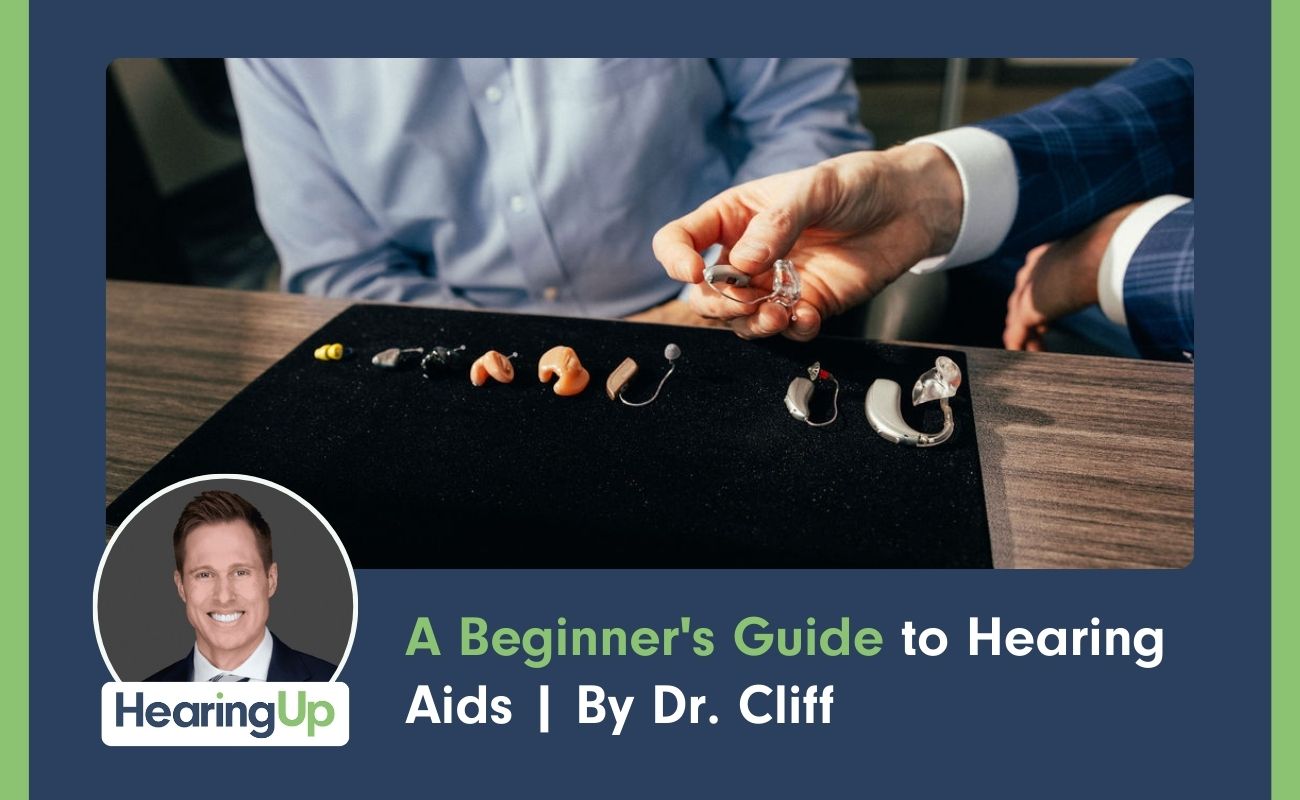
Hearing aid success requires 90-min evaluations, Real Ear Measurement programming, appropriate tech selection, 30-day adaptation and ongoing professional follow-up.
Read More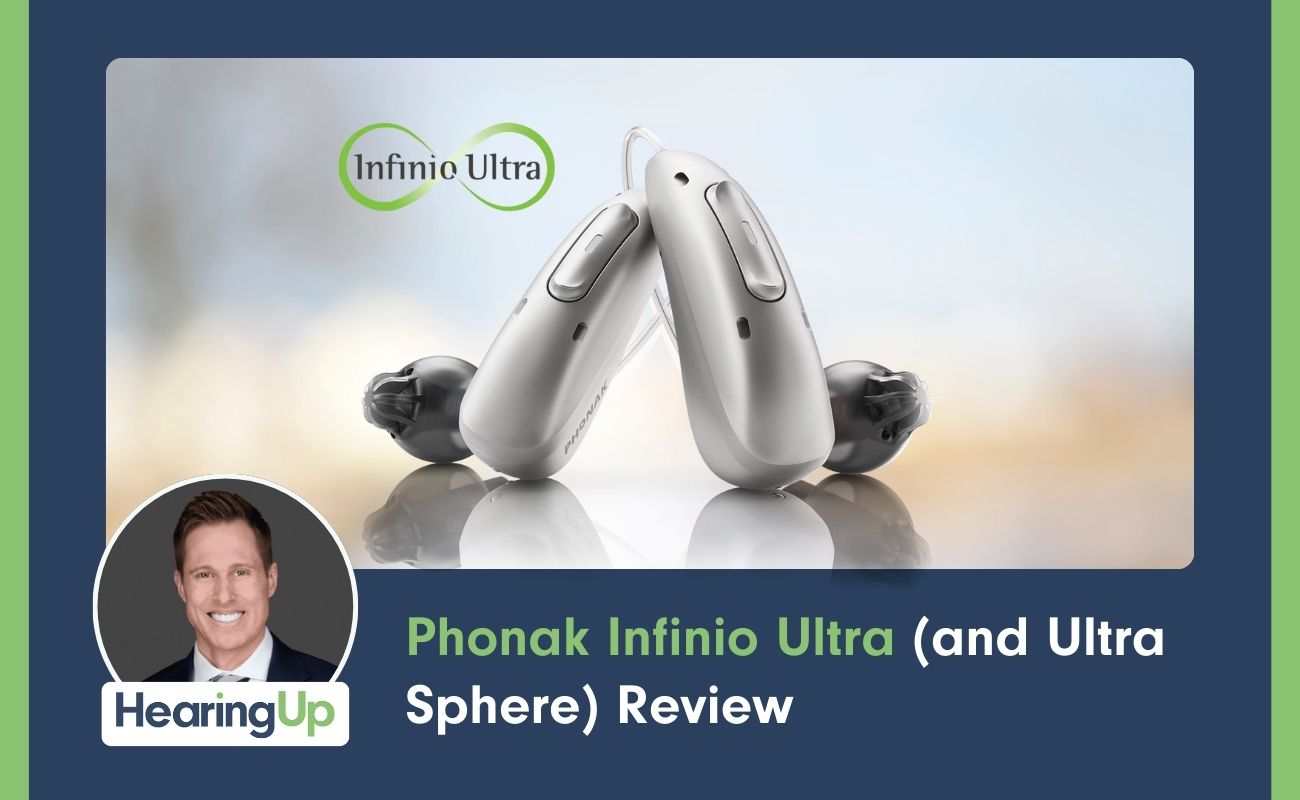
Phonak Infinio Ultra firmware adds AutoSense OS 7.0 (24% better), 30% improved battery (10hrs with AI), simplified Bluetooth pairing, and faster feedback tests.
Read More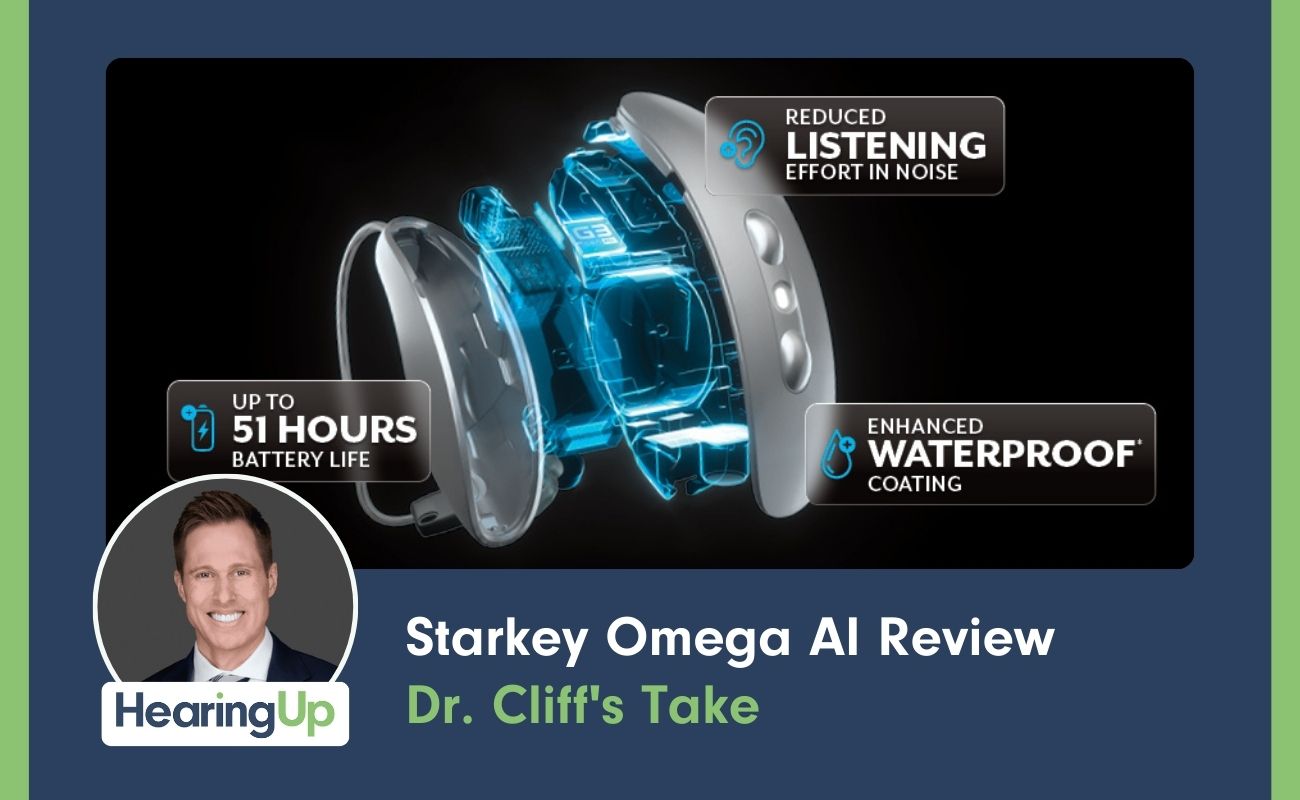
Starkey Omega AI improves on Edge AI with DNN 360 (19.6% better speech clarity), spatial awareness, find-my-hearing-aid lights, and 20x stronger custom shells.
Read More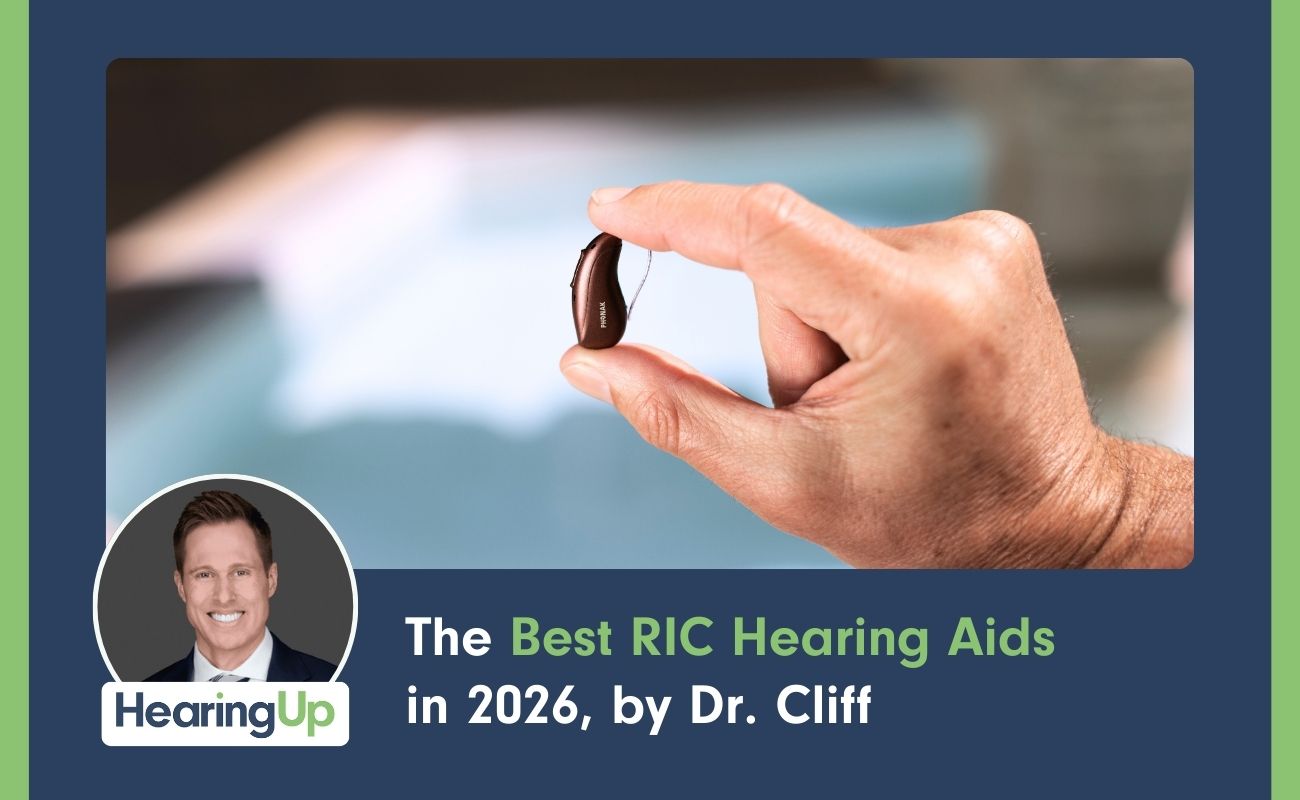
Top 2026 RIC hearing aids: Phonak Ultra Sphere Infinio (AI noise reduction), Starkey Omega AI, Oticon Intent, Signia IX, Widex SmartRIC.
Read More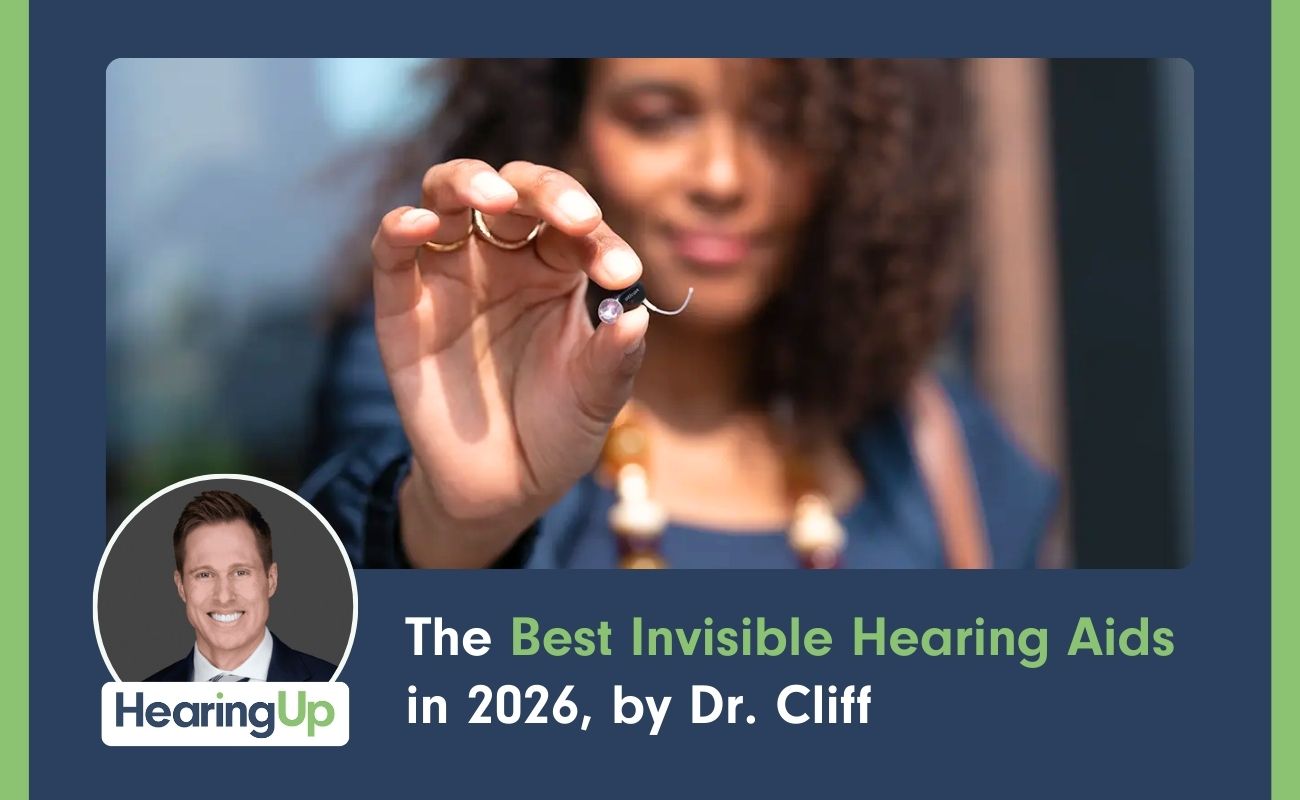
Best 2026 invisible aids: Oticon Zeal (AI/Auracast), Phonak Lyric (self-replace), Starkey IIC (minimal), Phonak Titanium (durable), Oticon Own (AI processing).
Read More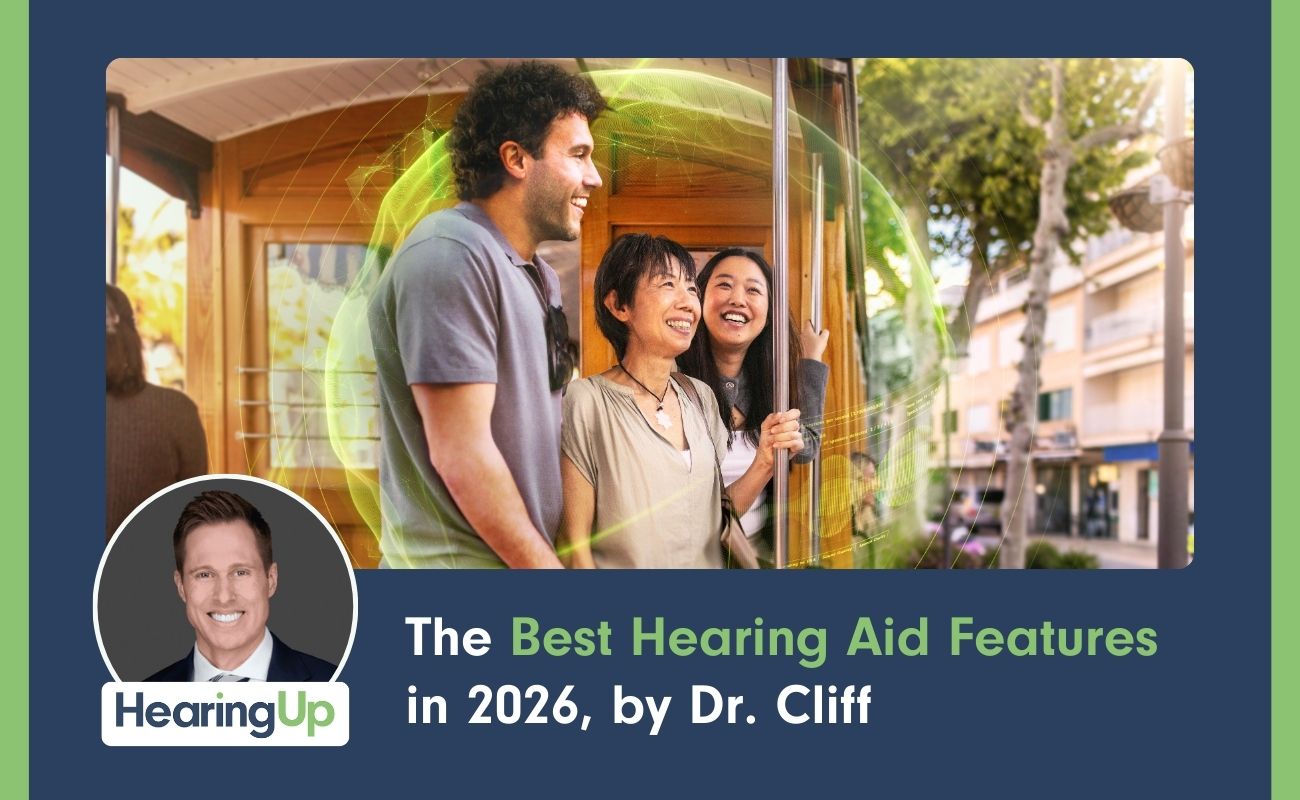
Auracast audio, remote care, DNN processing, custom ear molds, and durability tech lead 2026's most impactful hearing aid innovations for better sound and convenience.
Read More